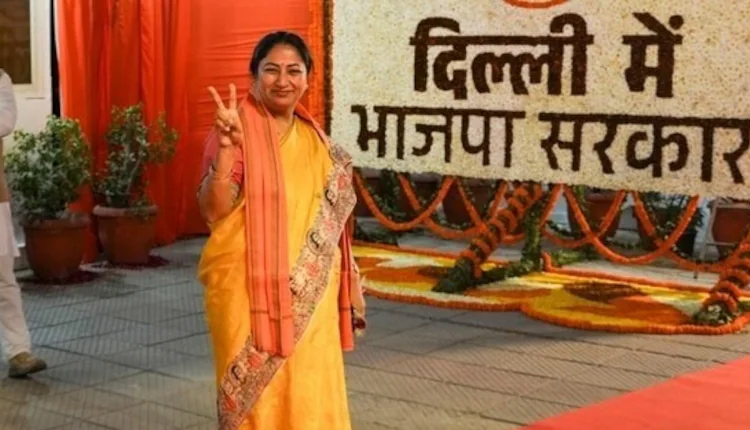New Delhi: On February 20, BJP’s new Chief Minister Rekha Gupta and her cabinet ministers swore in at Delhi’s historic Ramlila Maidan at a grand swearing-in ceremony. This place has a history, as it is where the India Against Corruption movement was centred in 2011 under the leadership of Anna Hazare, and it was from here that Arvind Kejriwal began his political career.
Attendees included Prime Minister Narendra Modi, Home Minister Amit Shah, Defence Minister Rajnath Singh, BJP President J.P. Nadda, and the chief ministers of all NDA-ruled states. The ceremony was momentous for the BJP, which returned to power in the national capital after 27 years. In this election, the BJP won 48 of 70 seats; the Aam Aadmi Party (AAP), which is in power, won only 22 seats.
Now Rekha Gupta has followed the footsteps of Sushma Swaraj (BJP), Sheila Dikshit (Congress) and Atishi (AAP) to become the 4th woman Chief Minister of Delhi. Besides her, other new ministers sworn in were Parvesh Verma, Kapil Mishra, Manjinder Singh Sirsa, and Ravindra Indraj Raj, Ashish Sood, and Pankaj Singh.
But the process of selecting the chief ministerial candidate went on for 11 days. The party’s strategists awaited PM Modi’s return from his U.S. visit and simultaneously sought the approval of the Rashtriya Swayamsevak Sangh (RSS). Gupta is likely to wield influence beyond just Delhi to national politics and elections that follow.
CM Rekha Gupta is a BJP leader. In fact, this marks the first time a woman has held the position of chief minister under the Modi regime. The last woman CM for BJP, until 2016, was Anandiben Patel, who was CM of Gujarat.
For over a decade, Delhi’s women voters have supported the AAP, on the back of its welfare schemes and free services. The BJP under Gupta now intends to consolidate its position among this vital voter base.
RSS Factor in Gupta Getting the Key Post
Gupta, who is in close proximity to the RSS, is also close to the senior RSS leader, Dattatreya Hosabale. She is a first-time MLA but has years of political experience, including three terms as a municipal councillor and former president of Delhi University Students’ Union (DUSU). However, AAP’s Shelly Oberoi defeated her in this year’s mayoral elections.
BJP MP Parvesh Verma was also one of the top contenders for the CM post, given that he had a big psychological win over AAP because he defeated none other than AAP chief Arvind Kejriwal in the New Delhi Assembly seat. However, the RSS supported Gupta, as the party’s leadership desired a woman CM who would avoid controversy and focus on governance.
Why is the BJP eyeing the Punjabi-Baniya vote bank?
Rekha Gupta, a member of the Punjabi-speaking Baniya community, has been appointed, which shows the BJP’s vision for retaining Delhi after pushing AAP out of power.
AAP has the traditional vote among women, Baniya, and Punjabi. To counter this, Kejriwal had appointed chartered accountant Narayan Das Gupta into the Rajya Sabha not once, but twice under AAP to embed the party further into this strata.
While appointing Gupta as CM, the BJP has also included two other Punjabi leaders—Ashish Sood and Manjinder Singh Sirsa—in a cabinet to balance the equation.
BJP Eyes Control Over MCD
The BJP’s current target is the Municipal Corporation of Delhi (MCD). The BJP, which recently regained control of the MCD, now has 116 councillors, the AAP has 14 seats, and the Congress has 08 councillors.
However, it will be a big win for the BJP if she beats Shelly Oberoi for mayor, as it comes after Oberoi defeated Gupta in the last mayoral election.
Among the newly elected MLAs were 11 BJP councillors, Rekha Gupta being one of them. Kamaljeet Sehrawat, a former BJP councillor, also became an MP from West Delhi in the 2024 Lok Sabha elections.
Expansion Plans of the BJP in Punjab
Changes in Delhi politics have a significant impact on other Northern states, particularly Punjab. Rekha Gupta’s movement comes from Haryana’s Jind district and is from the Baniya community in the Malwa region of Punjab, demonstrating substantial influence.
The AAP is two years away from the Punjab assembly elections, and a loss in Delhi could obstruct its ambitions in the state. Punjab has been a traditional stronghold of Congress and for the erstwhile Gupta community.
The changing political dynamics have prompted the BJP to prepare an emphatic campaign—backed by a robust team consisting of Rekha Gupta, Manjinder Singh Sirsa, Ashish Sood, and Parvesh Verma—to write down plans for Punjab. The party now wants to use its policies in a more tactical way in both Delhi and Punjab for the future of politics in the region.



Comments are closed.